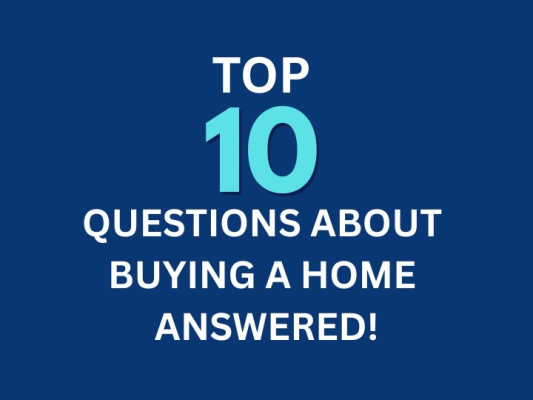

Top Ten Questions About Buying a Home Answered
By: Stuart Kiehne, President
1) How Much Can I Afford?
- Create a Budget: Start by listing all regular monthly expenses (rent, utilities, loans, insurance, etc.) and compare them to your household income.
- Use Online Calculators: Mortgage affordability calculators provide estimates based on your income, debts, and credit score. Use one of ours at www.Redwood-Mortgage.com/calculators
- Include Extras: Remember to factor in property taxes, homeowners' insurance, HOA fees, and maintenance costs when evaluating affordability.
2) What’s the Difference Between Pre-Qualification and Pre-Approval?
- Pre-Qualification: An estimate of what you could borrow based on information you provide. It’s quick and non-binding.
- Pre-Approval: A more official process where a lender reviews your credit, income, and debts to determine a set loan amount. This carries more weight with sellers.
- Practical Tip: Seek a pre-approval letter before shopping for a home to show sellers you’re a serious buyer.
3) How Much Down Payment Do I Need?
- Traditional 20% Down: Minimizes mortgage insurance and monthly payments, but it’s not mandatory
- Low Down Payment Programs: FHA loans require as little as 3.5% down, while conventional loans can go as low as 3% for qualified buyers. VA and USDA can even offer 0% down.
- Practical Tip: Assess your savings and consider factors like loan insurance, interest rate, and eligibility for specific programs when deciding on your down payment.
4) What Types of Mortgages Are Available, and Which One Is Best for Me?
- Conventional Loans: Typically require good credit and a stable financial profile; may have flexible down payment options.
- FHA Loans: Government-backed, lower credit and down payment requirements, but require mortgage insurance.
- VA and USDA Loans: Offer 0% down to eligible borrowers (veterans or rural property buyers), often with competitive rates.
- ARM vs. Fixed-Rate: An adjustable-rate mortgage (ARM) starts with a lower rate but can adjust over time, while a fixed-rate mortgage stays constant.
- Practical Tip: We will help you compare fees and monthly payments to determine the best option for you.
5) What Are Closing Costs, and How Much Will They Be?
- Typical Fees: Include appraisal, title services, recording fees, lenders fees and prepaid items like homeowners’ insurance or property taxes.
- Ballpark Range: Closing costs typically range from 2% to 5% of the home’s purchase price.
- Practical Tip: We will provide a Loan Estimate early in the process so you can plan to save extra beyond your down payment. You can also negotiate with the seller to cover some costs or shop around for services like title insurance.
6) How Does the Home Inspection Process Work, and What Should I Look Out For?
- Hire a Professional Inspector: They’ll assess the home’s structure, systems, and safety features.
- Attend the Inspection: Seeing issues in person helps you understand the severity and possible repair costs.
- Prioritize Key Issues: Focus on health and safety hazards (electrical, HVAC, roof, foundation) vs. minor cosmetic fixes.
- Practical Tip: Use the inspection report to negotiate repairs or credits with the seller if needed.
7) How Long Does the Home-Buying Process Take?
- Timeline: Generally 30–45 days from offer acceptance to closing, but it can be longer if issues arise in appraisal, inspection, or underwriting.
- Key Steps: Home search, offer & negotiation, inspection, appraisal, final mortgage approval, then closing.
- Practical Tip: Keep all documents organized, respond to lender requests promptly, and avoid big financial changes (like switching jobs) to prevent delays.
8) What Happens if the Home Appraisal Comes in Low?
- Renegotiate: Buyers can request a price reduction or ask the seller to cover a portion of the difference.
- Bridge the Gap: If you still want the property, you can make up the shortfall in cash.
- Dispute or Request a Second Appraisal: If you suspect errors or missed comparable sales, ask your lender if another opinion is possible.
- Practical Tip: Factor in the possibility of a low appraisal when making your offer, especially in competitive markets.
9) How Do I Choose the Right Neighborhood?
- Research Key Factors: Look at local schools, commute times, property taxes, safety, and nearby amenities (shops, parks, medical facilities).
- Visit at Different Times: Day, night, and weekends can each give a different feel for the neighborhood’s traffic, noise, and ambiance.
- Future Resale Value: Areas with growth, good schools, and rising property values can make a better long-term investment.
- Practical Tip: Talk to neighbors, drive around the area, and check community forums or social media groups for local insights.
10) How Do I Make My Offer Stand Out?
- Get Pre-Approved: A firm commitment from Redwood Mortgage Services shows sellers you can close the deal.
- Offer a Larger Earnest Money Deposit: Demonstrates seriousness and confidence in your finances.
- Flexible Closing Timeline: Meeting the seller’s preferred closing date can make your offer more appealing.
- Practical Tip: Work with a knowledgeable real estate agent who knows the local market and can advise on competitive strategies.
If you are ready to buy a home or have any questions Redwood Mortgage Services is here to help.


